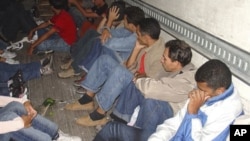"The scourge of human trafficking and modern slavery reaches into every corner of the globe, but perhaps nowhere more so than in East Asia and the Pacific," U.S. Deputy Assistant Secretary for East Asian and Pacific Affairs Joseph Yun said in his recent testimony before the U.S. Congress.
The United States Government broadly defines trafficking in persons as all conduct involved in reducing a person to or maintaining a person in a state of compelled service for sex or labor. Recent estimates suggest there are as many as 27 million men, women, and children worldwide who are victimized by this crime.
"Countries should strive to combat all forms of trafficking using the three ’P’ approach: punishment, prevention, and protection," Deputy Assistant Secretary Joe Yun said. "There are many examples of governments in the Asia-Pacific region taking steps to combat trafficking using this approach."
Indonesia's Police Women and Children’s Unit provided an example of successfully punishing traffickers. The unit was able to investigate and refer for prosecution dozens of cases, rescuing more than one hundred trafficking-in-persons victims.
Japan has prevented trafficking, in part because the country’s screening procedures have diminished the entertainer visa program, which in the past had provided the main means of entry for trafficking victims.
Thailand and Malaysia have made strides in protecting victims. Thai police have rescued sex trafficking victims from neighboring countries and Central Asia. In Malaysia, the government recently allowed an independent assessment of its shelters for sex trafficking victims, which is an important step towards needed improvement to victims’ care and protection.
"Although countries in the East Asia–Pacific region continue to suffer from these abuses of human liberty and dignity, we must acknowledge the real progress that countries in the region have made in a relatively short amount of time to combat human trafficking," Deputy Assistant Secretary Yun concluded. "Since the UN Protocol to Prevent, Suppress, and Punish Trafficking in Persons, especially Women and Children, also known as the Palermo Protocol, entered into force in 2003, the number of countries in the region to implement its provisions has more than doubled."
"The scourge of human trafficking and modern slavery reaches into every corner of the globe, but perhaps nowhere more so than in East Asia and the Pacific."




